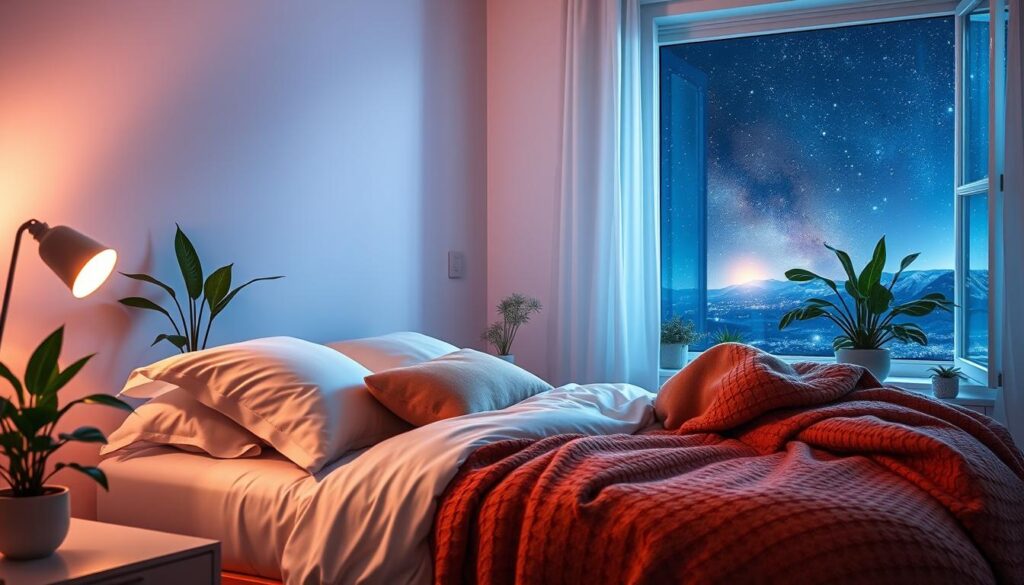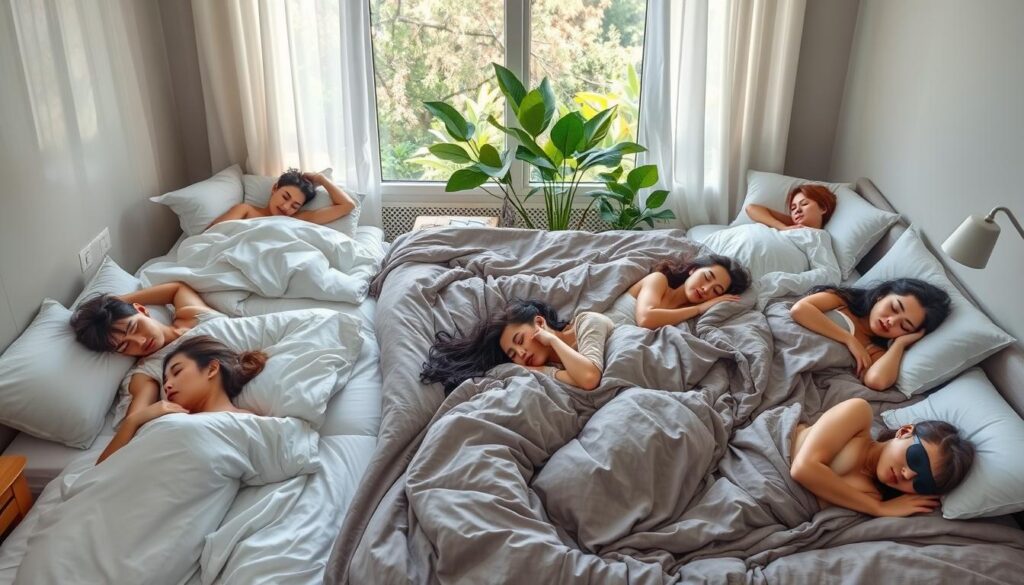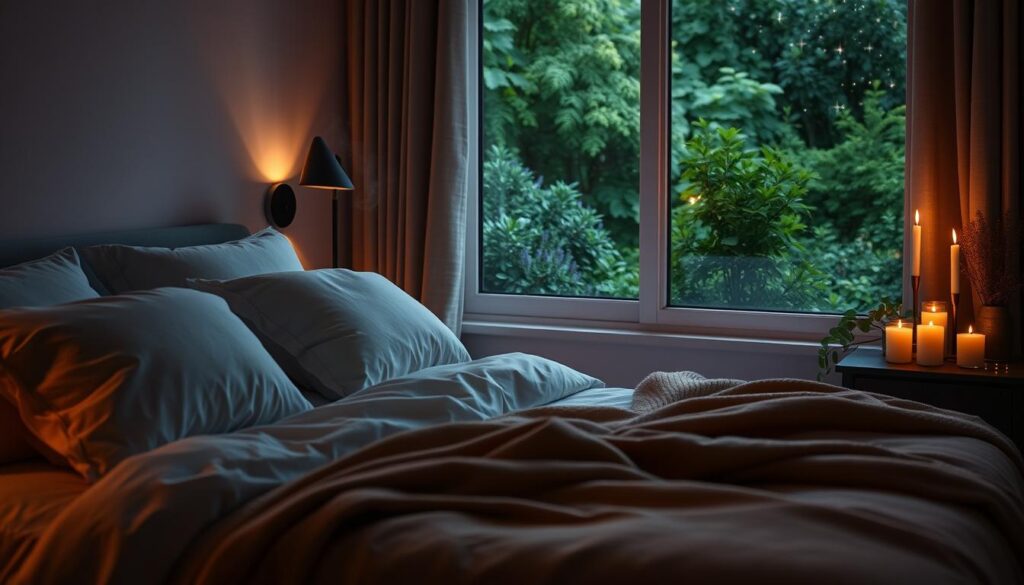Did you know that over two-thirds of people have struggled with sleep for months or years1? Sleep is key to our health and happiness, but many find it hard to get enough. This article will help you improve your sleep, covering important topics like sleep hygiene and creating a good sleep environment. You’ll also learn about the benefits of exercise and relaxation techniques. Follow these tips to wake up feeling refreshed and full of energy every day.
Key Takeaways
- Research shows that forming good habits is integral to health2
- Improving sleep hygiene is a critical aspect of public health strategy to combat issues of insufficient sleep and insomnia in the United States2
- The National Library of Medicine suggests getting at least seven hours of sleep each night for optimal health1
- Factors like age or health conditions can impact how sleep hygiene practices are tailored for different individuals2
- Exposure to smoke can lead to difficulties falling asleep and fragmented sleep1
The Importance of Sleep Hygiene
Quality sleep is key for our health and well-being. It affects our brain function and physical health. Yet, many people have poor sleep habits, which can harm their sleep quality and amount3.
What Is Sleep Hygiene?
Sleep hygiene is about the habits and environment that help us sleep well. It means going to bed and waking up at the same time every day. It also means having a relaxing bedtime routine and a comfortable sleep space4.
Why Does Sleep Hygiene Matter?
Good sleep hygiene is vital for our health. It affects how well we sleep and our overall health. Bad sleep habits can cause insomnia, tiredness during the day, and lower productivity35.
But, good sleep habits help us fall asleep faster and sleep deeper. This leads to more energy, a better mood, and sharper thinking4. It also improves our physical and mental health4.
Learning about sleep hygiene and using practical tips can greatly improve our sleep. This leads to a healthier and more balanced life34.
Optimizing Your Sleep Schedule
Getting a consistent sleep schedule is key for better sleep and health. Treat sleep as a must-do, setting a wake-up time every day, even weekends6. Aim for 7-9 hours of sleep each night to keep your circadian rhythm healthy, making it easier to sleep6.
Prioritize Sleep and Set a Consistent Wake-Up Time
Setting a regular wake-up time, even on weekends, is a great sleep tip. It helps your body’s clock stay in sync, leading to better sleep7. Don’t sleep in on weekends to keep your sleep patterns steady and improve weeknight sleep7.
Avoid Frequent Schedule Changes
Keeping a steady sleep schedule is vital for your body’s natural rhythm. Changes, like late nights or naps, can mess with your sleep at night7. Stick to a regular bedtime and wake-up time, even on weekends, to keep your sleep cycle healthy7.
| Sleep Optimization Tips | Benefits |
|---|---|
| Prioritize 7-9 hours of sleep per night | Supports physical and mental health6 |
| Establish a consistent wake-up time | Regulates the body’s internal clock7 |
| Limit daytime naps to 1 hour or less | Avoids disrupting nighttime sleep6 |
| Avoid frequent schedule changes | Maintains a healthy circadian rhythm7 |
“Consistency is key when it comes to optimizing your sleep schedule. By prioritizing a regular sleep routine, you can ensure your body’s natural rhythms are in sync, leading to better quality sleep and improved overall health.”
Creating a Calming Bedtime Routine
Starting a bedtime routine can really help you sleep better8. It includes activities done before bed, like reading or stretching8. It helps you get enough sleep, especially if you’re not sleeping well8.
Everyone’s bedtime routine is different. It depends on what you need and where you sleep8.
Wind Down for 30 Minutes Before Bed
It’s important to wind down before bed to relax8. Going to bed at the same time every night trains your brain8. Doing calm things like stretching or reading can prepare your body for sleep8.
Eating foods like cherries or drinking herbal teas can also help you sleep8.
Dim the Lights and Unplug from Electronics
When it’s time to wind down, think about your light exposure and electronics8. Devices with screens can make it hard to fall asleep. Try to avoid screens before bed8.
Dimming the lights and turning off screens makes your bedroom better for sleep9. Doing things like journaling or listening to soft music can also help9.
Adding these relaxation techniques to your bedtime can make it easier to fall asleep89.
Healthy Daily Habits for Better Sleep
Getting quality sleep is more than just sleeping a lot. Your daily habits and lifestyle choices matter a lot. Adding a few simple habits to your routine can greatly improve your sleep10.
Exercise is great for sleep. Try to do at least 30 minutes of physical activity each day. But, don’t do intense workouts right before bed, as they can keep you awake10. Also, watch how much caffeine and alcohol you drink. Too much caffeine, especially in the afternoon and evening, can mess with your sleep11. And, stop drinking alcohol at least three hours before bed to avoid bad sleep11.
What you eat also affects your sleep. Eat foods rich in fiber like vegetables, fruits, and whole grains for better sleep12. Avoid eating heavy or late-night meals to avoid sleep problems12. Quitting smoking can also help a lot, as nicotine can keep you awake10.
Try relaxation techniques like deep breathing, meditation, or thinking about things you’re grateful for. These can help you relax and sleep better12. Also, keep a regular sleep schedule, including eating at the same times, to help your body get into a rhythm10.
By changing your daily habits, you can improve your sleep and health. Remember, even small changes can make a big difference in how well you sleep10.
Optimizing Your Sleep Environment
Creating a sleep-friendly space is key for quality rest. A comfy mattress and bedding, plus a cool, dark, and quiet room, boost sleep and health13.
Invest in a Comfortable Mattress and Bedding
A good mattress is crucial for sleep. Research shows 80% of people sleep better with the right mattress14. Soft sheets and a cozy comforter also add to your comfort and sleep.
Maintain a Cool, Dark, and Quiet Bedroom
Your bedroom’s setup affects sleep. A cool room, around 65 degrees, can improve sleep by 30%14. Use blackout curtains or an eye mask for light, and earplugs or a white noise machine for quiet.
Also, clean your bedding often to cut down on dust mites. This can help with allergies and better sleep13. Regular cleaning can reduce allergy sleep issues by 70%, leading to better sleep14.
By making your sleep space comfy, cool, dark, and quiet, you’ll sleep better and wake up refreshed13.
“A good mattress is hard to find. Improve your sleep environment, and you’ll improve your sleep.” – The Sleep Foundation
Sleep Optimization and Individual Differences
Everyone’s sleep needs are different. What works for one person might not work for another. Your individual sleep needs and what you like can help figure out the best sleep habits for you15. Things like your age, health, and what you prefer can also affect your sleep16.
It’s important to try out different sleep habits to see what works best for you. You might need to change the lighting, temperature, or sounds in your room. Or, you could add relaxing activities to your bedtime routine15.
Understanding that sleep solutions are not the same for everyone is key. Paying attention to what your body tells you can help you create a sleep space and routine that meets your individual sleep needs. This way, you can wake up feeling refreshed and ready to go16.
| Characteristic | Prevalence |
|---|---|
| Individuals in industrialized countries who spend their day indoors under artificial light, especially in the evening/night hours | Up to ~90%15 |
| Land area showing artificial light at night | ~10%, potentially rising to 23% including skyglow15 |
| Annual increase in evening/night light exposure | 3%–6% in radiance and extent15 |
| US adults who fail to attain sufficient sleep on a regular basis | Approximately 70%16 |
| Industrialized country population engaged in shift work | Approximately one-quarter16 |
By understanding the unique aspects of individual sleep needs and sleep hygiene customization, you can tailor your sleep approach. This can lead to better sleep and overall health1516.
The Role of Exercise in Sleep Optimization
Being active can greatly improve your sleep and body rhythm. Activities like cardio, strength training, or yoga help set your body’s clock right. They make you sleep better17. Yoga, light stretching, and breathing before bed can also help you fall asleep faster and wake up feeling refreshed17.
Exercise Regularly, but Avoid Intense Activity Before Bed
When and how you exercise matters for sleep. Doing intense workouts before bed can keep you awake17. But, exercising late at night might actually help some people sleep better17.
Bad sleep can make you less active. People with sleep problems move less than those who sleep well17. This shows that sleep and activity are connected.
It’s key to balance exercise and sleep for good health. Regular activity, but not intense before bed, can improve your sleep. This supports your body’s natural rhythm1718.
| Sleep Quality Metrics | Exercise Before Bed | Exercise in the Evening |
|---|---|---|
| Sleep Onset Time | Increased | Decreased |
| Total Sleep Time | Decreased | Increased |
| Sleep Efficiency | Decreased | Increased |
“Regular physical activity can enhance sleep quality for adults by reducing sleep onset time and decreasing nighttime wakefulness, potentially reducing the need for sleep medications in some individuals.”17
Managing Caffeine and Alcohol for Better Sleep
Getting quality sleep is key for our health and happiness. But, caffeine and alcohol can mess with our sleep. Knowing how they affect sleep is the first step to better sleep.
Caffeine keeps us awake by blocking sleep. Studies show it can mess up sleep if we drink it 6 hours before bed19. Too much caffeine can cut down on sleep and change how we sleep, making us wake up more at night19. We might need more caffeine to feel alert, and some people should avoid it later in the day19.
Alcohol might make us feel sleepy at first, but it can mess with sleep later. It can cut down on REM sleep, changing how we sleep19. Drinking too much alcohol can hurt our sleep quality over time, affecting our health19. It’s best to stop drinking alcohol 4 hours before bed to let our body process it19.
To sleep better, watch how much caffeine and alcohol you drink. Pay attention to when you drink them. This helps you change your habits to improve your sleep19. About 88% of people who drink caffeine in the afternoon have sleep problems20. Drinking caffeine too close to bedtime can make it hard to sleep well20. People with insomnia might make things worse by using caffeine to stay awake during the day20.
Knowing how caffeine and alcohol affect your sleep helps you make better choices. This can improve your sleep and overall health.
| Substance | Impact on Sleep | Recommended Guidelines |
|---|---|---|
| Caffeine |
– Disrupts sleep patterns – Reduces total sleep time – Decreases deep sleep |
– Limit consumption to 400 mg per day20 – Avoid caffeine at least 8 hours before bedtime20 |
| Alcohol |
– Decreases REM sleep – Reduces overall sleep quality |
– Limit consumption to at least 4 hours before bedtime19 |
By following these tips and watching your caffeine and alcohol intake, you can improve your sleep. This is a big step towards better health and happiness1920.
Using Relaxation Techniques for Sleep Optimization
Adding relaxation techniques to your bedtime routine can greatly improve sleep. Mindfulness meditation, progressive muscle relaxation, and controlled breathing can calm your mind and body. This makes it easier to fall asleep and stay asleep. These methods focus on relaxation, which can lead to better sleep quality.
Mindfulness, Meditation, and Controlled Breathing
Jobs like doctors, drivers, and soldiers often lead to poor sleep21. Short naps can help counteract sleep debt, improving daytime alertness and performance21. Adding relaxation techniques to naps increases total sleep time, especially N2 sleep stage21.
Combining these techniques can make you more alert when you wake up.21 Hypnotic suggestions, music, and muscle relaxation improve sleep quality21. The US and French Army focus on sleep education to improve soldiers’ performance21. In the French armed forces, techniques like positive reinforcement and muscle relaxation are used to enhance performance21.
A study with eleven middle-aged military volunteers showed RT’s promise in improving sleep during naps21. 44 percent of adults experience sleepless nights due to stress at least once a month (national survey).22 20 to 25 minutes of gentle breathing and muscle relaxation are recommended daily for two weeks.22
Yoga, tai chi, and meditation can improve sleep by reducing stress hormones and slowing heart rate and breathing.22 Recommended stress relief techniques include gentle breathing and muscle relaxation to fight insomnia.22
Tracking Your Sleep for Optimization
Keeping a sleep diary or using a sleep tracking device can give you great insights into your sleep. It helps you see where you can improve23. By tracking your sleep time, quality, and any disturbances, you can find the best changes for you23. Sharing this info with your doctor can also help with sleep issues.
Sleep tracking tech has gotten much better, offering many devices and apps24. You can choose from wearables like bracelets or rings, or non-wearable sensors for your bed24. These tools monitor things like breathing, heart rate, and even your bedroom’s temperature24.
When picking a sleep tracker, look at its accuracy, how easy it is to use, and how much insight it gives24. Many athletes and fitness fans use them to boost their performance and health24. But, it’s key not to get too caught up in the numbers and keep a balanced view of your sleep and health24.
Adding sleep tracking to your routine can give you valuable insights for better sleep23. Whether it’s a diary or a device, choose what fits your needs and likes best.
“Sleep is the golden chain that ties health and our bodies together.” – Thomas Dekker
When to Seek Professional Help
While this guide offers many ways to improve sleep, some cases need professional help. If you face ongoing sleep issues like insomnia or sleep apnea, see a healthcare provider25.
A healthcare provider can check for underlying health problems and suggest treatments. They can help you get the sleep you need25. Some people need more than 7 to 8 hours of sleep to feel rested25.
Sleep disorders like sleep apnea can make you feel tired during the day, even after sleeping enough. Nighttime interruptions can also disrupt sleep. A sleep study might be needed to find the cause of these problems25.
If you’re dealing with sleep disorders or insomnia, don’t wait to get help. Your healthcare provider can create a plan to improve your sleep and health.
Good sleep habits, a regular sleep schedule, and a calming bedtime routine are key. But sometimes, you need more help26. Working with a healthcare provider can help you find the best solutions for your sleep needs26.
Conclusion
Learning to optimize your sleep is a journey. By using the tips from this guide, you can change how you sleep. You’ll wake up feeling refreshed and full of energy every day27.
Good sleep hygiene is key to your health and happiness. Make sleep a priority. Create a sleep-friendly environment. Add relaxation practices to get the most from your sleep27.
With effort and commitment, you can get the sleep your body needs. This will help you thrive.
About 25% of how well you do in school is linked to sleep28. Going to bed and waking up earlier can lead to better grades. Healthy sleep habits, like a regular schedule and a calming bedtime routine, can boost your sleep quality27.
By focusing on sleep, you can enjoy better rest. This will improve your overall well-being.
Your path to better sleep is personal. Keep trying new things and track your progress. Adjust as needed to find what works for you. With the right approach, you can get the sleep your body and mind need.
FAQ
What is sleep hygiene?
Why is sleep hygiene important?
How can I build a consistent sleep schedule?
What should my bedtime routine look like?
How do daily habits and behaviors impact sleep quality?
How can I optimize my sleep environment?
How do individual differences affect sleep optimization?
How does exercise affect sleep quality?
How do caffeine and alcohol affect sleep?
How can relaxation techniques help with sleep optimization?
How can I track my sleep to optimize it?
When should I seek professional help for sleep issues?
Source Links
- https://www.sleepfoundation.org/sleep-hygiene/healthy-sleep-tips
- https://www.sleepfoundation.org/sleep-hygiene
- https://www.ncbi.nlm.nih.gov/pmc/articles/PMC4400203/
- https://www.baptisthealth.com/blog/health-and-wellness/why-is-sleep-hygiene-important
- https://newsinhealth.nih.gov/2021/04/good-sleep-good-health
- https://www.mayoclinic.org/healthy-lifestyle/adult-health/in-depth/sleep/art-20048379
- https://www.sleepfoundation.org/sleep-hygiene/how-to-reset-your-sleep-routine
- https://www.sleepfoundation.org/sleep-hygiene/bedtime-routine-for-adults
- https://www.sleepcareonline.com/articles/ideal-bedtime-routine-for-adults/?srsltid=AfmBOoqYh0vUlRfi6hw2jXbe7bc-y-qONseJICxxOIe7LK60nxAikgfC
- https://www.sleepfoundation.org/sleep-habits
- https://www.realsimple.com/habits-to-sleep-better-8710591
- https://www.heart.org/en/healthy-living/healthy-lifestyle/sleep/sleep-better-with-healthy-lifestyle-habits
- https://www.sleepfoundation.org/bedroom-environment
- https://pillow.app/article/creating-an-optimized-sleep-environment
- https://pmc.ncbi.nlm.nih.gov/articles/PMC7879412/
- https://www.sleephealthjournal.org/article/S2352-7218(23)00166-3/fulltext
- https://www.sleepfoundation.org/physical-activity/exercise-and-sleep
- https://pmc.ncbi.nlm.nih.gov/articles/PMC10503965/
- https://www.rupahealth.com/post/the-effects-of-alcohol-and-caffeine-on-sleep-how-to-enjoy-wisely
- https://www.sleepfoundation.org/nutrition/caffeine-and-sleep
- https://www.ncbi.nlm.nih.gov/pmc/articles/PMC5985461/
- https://www.hopkinsmedicine.org/health/wellness-and-prevention/sleepless-nights-try-stress-relief-techniques
- https://sleepspace.com/
- https://www.sleepfoundation.org/best-sleep-trackers
- https://www.hopkinsmedicine.org/health/wellness-and-prevention/sleep-answers-from-sleep-expert
- https://bayareacbtcenter.com/sleepmaxxing/
- https://www.sleepfoundation.org/how-sleep-works/why-do-we-need-sleep
- https://www.nature.com/articles/s41539-019-0055-z






